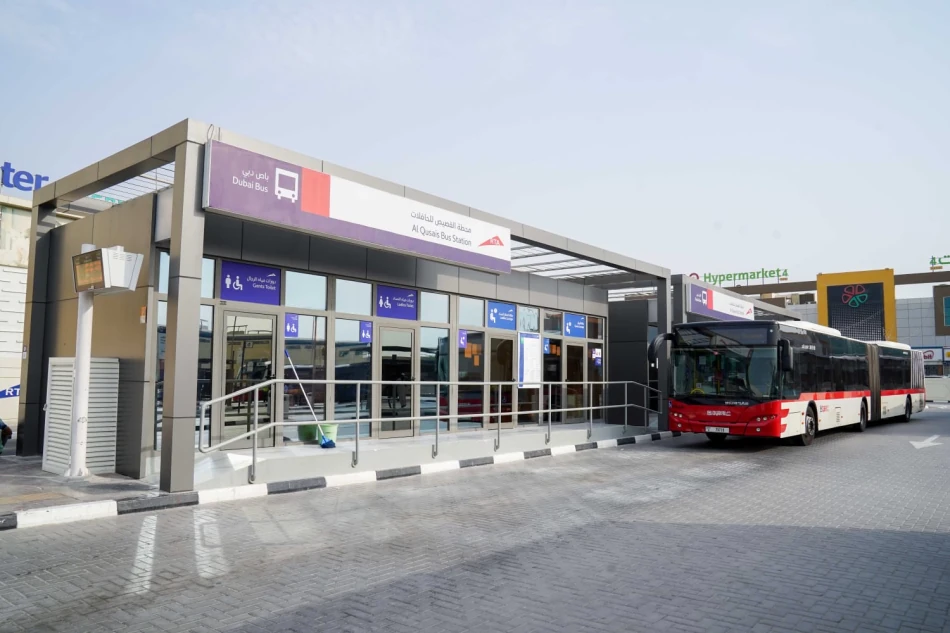
Dubai's Roads Authority Enhances Public Transport with 22 Upgraded Passenger Stations and Bus Shelters
Dubai's $100M+ Bus Network Overhaul Signals Major Push for Public Transit Dominance
Dubai's Roads and Transport Authority has completed a comprehensive upgrade of 22 bus stations across the emirate, marking the latest phase in an ambitious strategy to position public transportation as the backbone of urban mobility. The project, encompassing 16 passenger stations and 6 bus depots, represents more than infrastructure development—it's a calculated move to reshape how residents and visitors navigate one of the world's most car-dependent cities.
Strategic Infrastructure Investment Beyond Basic Transit
The station upgrades extend far beyond typical transit improvements. Mattar Al Tayer, Director General of Dubai's RTA, emphasized that these facilities transcend mere waiting areas, incorporating integrated services designed to enhance user experience and satisfaction. The enhanced stations feature prayer rooms, bicycle parking facilities, improved accessibility for people with disabilities, and seamless integration with Dubai Metro and taxi services.
Nine upgraded stations serve the historic Deira district, while seven are located in Bur Dubai, collectively handling 110 bus routes with peak-hour capacity for approximately 710 buses. This strategic placement targets Dubai's most transit-dense areas, where public transport adoption rates typically determine system-wide success.
Fleet Modernization Mirrors Regional Competition
Dubai's approach parallels aggressive public transit investments seen across Gulf states, particularly as cities compete for sustainable urban development leadership. The emirate operates a 1,387-bus fleet meeting Euro 6 emission standards—the first such deployment in the Middle East and North Africa region.
A recently signed contract for 637 additional buses, scheduled for delivery in 2025-2026, signals long-term commitment to transit expansion. The order includes 40 electric buses from Zhongtong, 400 MAN city buses, double-decker Volvo units, and articulated buses designed for high-density routes. This diversified fleet strategy suggests Dubai is preparing for varied urban scenarios rather than adopting a one-size-fits-all approach.
Electric Bus Pilot Tests Regional Appetite
The inclusion of 40 electric buses represents more than environmental positioning—it's a market test for regional electric transit viability. Unlike European or East Asian markets where electric buses operate in temperate climates, Dubai's extreme summer temperatures and energy demands create unique operational challenges. Success here could establish Dubai as a regional hub for electric transit technology adaptation.
First and Last Mile Strategy Addresses Urban Planning Reality
The RTA's emphasis on "first and last mile" connectivity acknowledges a fundamental challenge facing transit systems in sprawling, car-centric cities. By integrating pedestrian pathways, bicycle parking, and safe crossings, Dubai addresses the practical barriers that often prevent residents from choosing public transit over private vehicles.
This approach mirrors successful transit integration strategies in Singapore and Hong Kong, where seamless connections between different transport modes drive high ridership rates. However, Dubai faces the additional challenge of retrofitting transit-oriented development in a city originally designed around automobile access.
Economic and Investment Implications
The bus network expansion represents significant public infrastructure investment at a time when many cities globally are reassessing transit spending priorities. For Dubai, enhanced public transportation supports broader economic diversification goals by reducing transportation costs for residents and improving accessibility to employment centers.
The project also positions Dubai favorably for sustainable finance markets, where transportation infrastructure increasingly influences investment decisions. As ESG criteria become more prominent in regional investment flows, cities with robust public transit systems may gain competitive advantages in attracting international capital.
Regional Transit Leadership Stakes
Dubai's comprehensive approach to bus network modernization occurs amid intensifying regional competition for urban innovation leadership. While Abu Dhabi focuses on autonomous vehicle trials and Saudi Arabia develops new smart cities, Dubai's strategy emphasizes immediate, practical improvements to existing urban infrastructure.
The success or failure of this bus network expansion will likely influence transit investment decisions across the Gulf region, where cities face similar challenges balancing rapid growth with sustainable transportation options. Dubai's experience integrating modern transit systems with traditional urban layouts could provide valuable insights for other regional capitals navigating similar transitions.
Most Viewed News

 Sara Khaled
Sara Khaled






